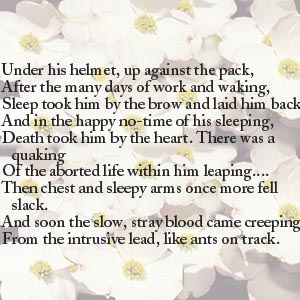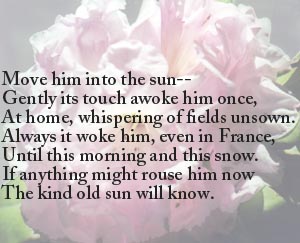|
Tribute to Fallen Rangers
What passing bells for these who die as cattle?
What candles may be held to speed them all?
|

|

|
DDay and the breaching of Hitler's Atlantic Wall was just the beginning of a long tedious drawn out campaign to free Europe from Nazi terror and repression. From Normandy, the Rangers would go on to Brittany, participating in the Battle of Brest. At the end of September 1944, the Rangers boarded rail cars bound for Arlon, Belgium. 2nd Rangers were trucked from Belgium to Esch, Luxembourg. Then from Esch to the vicinity of Bearen, Belgium. And finally into Germany itself. In the autumn of 1944, the Allied advance had faltered. The weather that fall was nothing short of miserable - frigid rain and snow falling relentlessly, creating thick mud flows that reached a man's knees and halted tanks. Allied troops camped along the German border were worn down by a constant barrage of artillery and mortar fire. Casualties were high and a steady stream of replacements flowed in to swell the dwindling companies. Among the thousands of faceless, unknown replacements was a 23 year old from Illinois named Leroy Rogers. Leroy was sent to the 2nd Rangers. The family that he had left behind never saw him again: in November 1944, Leroy Rogers was killed in action. And his family back in Illinois tried for over 50 years to learn how and where Leroy had died, but always came up short. Leroy's nephew, Gary Underwood, began searching the Internet for anyone who might have information about his uncle. In July 1999, I received the following e-mail from Gary:
E-mail from Morris Webb, 2nd Bn Rangers, Company D to Vivian Corbin: ....... This is an interesting story. For 55 years [Gary Underwood] and his mother didn't know exactly how his Uncle had died and did not know where he was buried. All they knew for sure was that he was in the 2nd Ranger Battalion and they were told by the Uncle that he was in D Company. I was in D Company of the 2nd Ranger Bn. so my friend and fellow Ranger passed the problem on to me. I went through all the material I had and even called the former Company Clerk who lives in Las Vegas and was noted for his memory, down to rattling off ones serial number. But even he could not make a positive I.D. of this Ranger so I had to get on the line and tell this young man that we couldn't place him in D Company. End of story! Later I had the D Company book out, "D for DOG" written by Al Baer, Jr. from Memphis, TN, I was in the section about Vossenack, Germany when VOILA! There is the lost relative's name. I then had immediate and complete recall! After 55 years, clear as a crystal. The young soldier was in my section of the 2nd Platoon. He and his best friend was on guard duty inside this burned out house when he was hit by a piece of shrapnel from a German mortar. I and another Sgt. ran out to see about them. The friend was knocked out but Rogers was hit in the head. We didn't know how bad he was but he needed to get to the aid station, about half a mile away over bombed out muddy road. The other Sgt. said I'll see if there is a jeep outside. He was gone only a few minutes and he was back with this jeep. We took Rogers and laid him on the hood of the jeep and I spreadeagled on top of him and we left on a very hazardous drive to the aide station. Fortunately we got there in one piece. We got Rogers inside and the Dr. looked him over and turned to us and said that he should have been killed outright; he didn't know what hit him and, in fact, expired in very short order afterwards. So I got back on the PC and sent this young man the "rest of the story" about his Uncle. Naturally I felt badly about my loss of memory about the event and Rogers was a recent replacement so I had a poor excuse for my lack of memory. Needless to say, the Nephew and his mother were greatly relieved to finally learn the rest of the story. A Ranger in the 1st Platoon remembered the young man and in fact had a photo of his grave in the cemetery that Rogers was buried in..... Morris N. Webb, Original member of the 2nd Bn from Camp Forrest, TN to Czechoslovakia to disbanding in VA. I was the Platoon Sgt. of the second platoon from just after the Hill 400 battle to the disbanding. They should have cheered when the Berlin Wall fell, gazed upon the stars with Columbia, and muddled through PC operating instructions. And then there are the families who lost a son, a brother or a father who still grieve their loss half a century later. By recalling the event that led to Leroy Rogers' death, you put flesh on a name for those of us who never knew him. It was so kind of you to try to find him for his family. What a wonderful gift! Tonight there is in heaven a star with Leroy Rogers' name. It's hard to imagine not knowing how your loved one died or where.....
The story of the Underwoods' quest did not end here. Ten years earlier, in 1989, during the 45th Anniversary of D-Day, Morris' friend and fellow Ranger Bud Potratz, made a pilgrimage to the Henri-Chapelle Cemetery in Belgium to pay homage to fallen comrades who lost their lives in the 1st Army's drive through northern France into Belgium, Holland, Luxembourg and Germany, a bitter campaign which began in September 1944 and continued throughout the winter. In that stone silent world of painful memories, Bud stood next to Leroy's grave, a gesture immortalized in a photograph. Now, a decade later, after learning of Gary's search for his uncle, Morris rung up his old friend. Bud found the photograph and sent it to Gary, along with a letter:
Rogers was obviously past the point where the Company aid man could help him. It was imperative to get him to the Battalion Aid Station immediately. Hoffman ran out to the road, and tested one of the jeeps that had been hit or simply abandoned in the battle for Vossenack. The first vehicle he tested was in working condition. Hoffman drove, with Webb holding the unconscious man on the hood. It was a hellish ride, over half a mile of dark, cratered road, with artillery bursting ahead, behind and on both sides of them.
"We finally got him to the aid station", Sergeant Webb finished the story, "but he didn't live long after that. Doc Block said later he should have died instantly, because- well, if you'd seen him, you'd know why."
|

|
|

|
|

|
|

|
|

|
|

|

